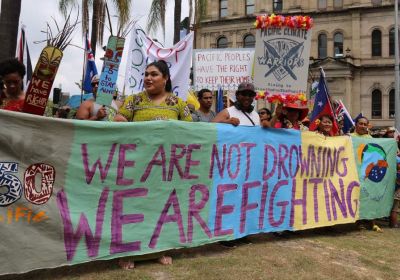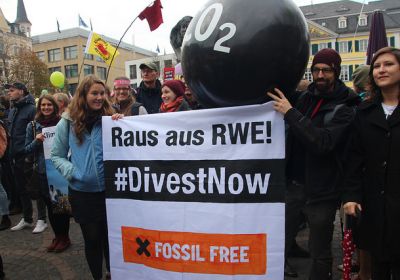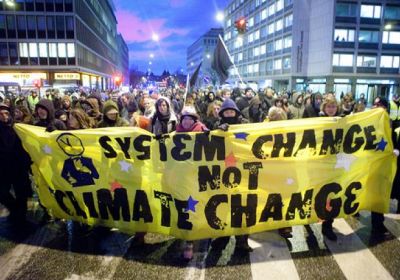-
-
-
-
-
-
-
 Tacloban, Leyte, Philippines, after Typhoon Haiyan in 2013. Photo: Tony Iltis.
Millions of people fleeing storms that flood major cities within hours, or intense fires that burn towns to the ground — welcome to a climate change apocalypse. It is not a scene from science fiction film, but a fast approaching reality.
Tacloban, Leyte, Philippines, after Typhoon Haiyan in 2013. Photo: Tony Iltis.
Millions of people fleeing storms that flood major cities within hours, or intense fires that burn towns to the ground — welcome to a climate change apocalypse. It is not a scene from science fiction film, but a fast approaching reality.
-
Two weeks into a protracted election campaign, it is looking ever-more likely that climate change is to be placed way down the order of business – at least for the major parties. The contest over climate change that characterised the previous three federal elections seems to have disappeared off the political radar despite the issue being more urgent than ever.
-
 In many ways, environment minister Greg Hunt's attendance at the New York signing of the Paris Agreement on April 21 underscored the Coalition government's resistance to in taking real action to curb toxic carbon dioxide emissions.
In many ways, environment minister Greg Hunt's attendance at the New York signing of the Paris Agreement on April 21 underscored the Coalition government's resistance to in taking real action to curb toxic carbon dioxide emissions. -

Ian Angus is a Canadian ecosocialist activist and author. The editor of Climateandcapitalism.com, Angus is also the co-author of Too Many People? Population, Immigration, and the Environmental Crisis with former Green Left Weekly editor Simon Butler (Haymarket, 2011).
-
 People's Climate March, Sydney, November 29.
The Paris Agreement on climate change, which emerged out of the November 30 to December 12 COP21 UN climate talks, has been hailed as a “turning point for the world'. But it is long on rhetoric and short on real commitments – below are seven reasons why.
People's Climate March, Sydney, November 29.
The Paris Agreement on climate change, which emerged out of the November 30 to December 12 COP21 UN climate talks, has been hailed as a “turning point for the world'. But it is long on rhetoric and short on real commitments – below are seven reasons why.
1. It sets an ambitious target sure to be missed
-
 The circus is over. The suits have left Paris after the November 30-December 12 UN climate talks (COP21). There have been millions of words written about the text. But one fact stands out. All the governments of the world have agreed to increase global greenhouse gas emissions every year between now and 2030. Why? Because all the countries have agreed to accept the promises of all the other countries.
The circus is over. The suits have left Paris after the November 30-December 12 UN climate talks (COP21). There have been millions of words written about the text. But one fact stands out. All the governments of the world have agreed to increase global greenhouse gas emissions every year between now and 2030. Why? Because all the countries have agreed to accept the promises of all the other countries.
United Nations Climate Change Conferences
United Nations Climate Change Conferences





